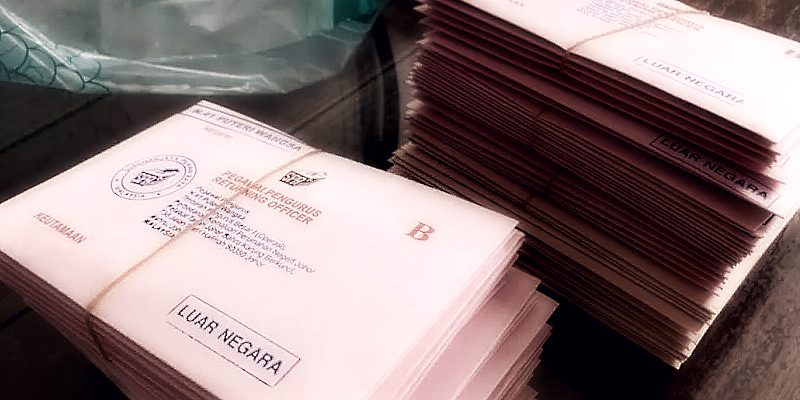November 16, 2022
KUALA LUMPUR – The 15th general election is off to a raucous start, and we only have another four more days to go before Saturday’s polling day.
In the meantime, overseas voters appear to be the forgotten lot. So far the election commission has yet to announce the exact number of overseas voters, but according to Global Bersih secretary-general Nirmala Devi Windgaetter, there are an estimate of around 50,000 postal ballot papers.
At this moment, many overseas voters in more than 14 countries and territories have complained that they are still waiting for their ballot papers to arrive, including those currently living in Singapore, Greater China and Australia.
Well, if even people in a place as near as Singapore have yet to receive their ballot papers, we cannot have too much hope those living much further away will get theirs on time.
Even if they manage to get hold of their ballot papers these two days, there is very little hope their marked ballot papers can reach the vote counting centers by Saturday afternoon.
If we were to distribute these 50,000 votes evenly among the 222 parliamentary constituencies nationwide, each seat will get an average of 225 votes.
There were more than a dozen seats in each of the last two elections with majorities under a thousand votes. Given the very close fights in this week’s election, several hundred votes can really make a difference and could even twist the nation’s destiny over the next five years!

As soon as caretaker PM Ismail Sabri Yaakob announced the dissolution of parliament last month, Sin Chew Daily urged the EC to announce the nomination day earlier and extend the campaign period between the nomination day and polling day so that overseas voters could have sufficient time to send back their marked ballot papers. Back then, Bersih also made the same suggestion with the hope the chaos around postal voting in the 2018 election would not be repeated this time. Unfortunately we are all disappointed again.
The EC has not announced the total number of overseas voters, and has never taken into account whether a delay in sending out the ballot papers will affect the vote counting operation on the polling day.
According to DAP candidate Khoo Poay Tiong, in a particular case in Beijing, a ballot paper that was supposed to be sent to the Chinese capital on November 7 was not sent until 9.39 a.m. on November 12. Upon inquiry with the courier company, the voter learned that all postal voters in Beijing would only receive their ballot papers at 6 p.m. November 17, barely one and a half days before polling!
The EC should explain why this has happened, or perhaps initiate a campaign to get volunteers to personally bring back overseas ballot papers to Malaysia, instead of taking no action for this whole farce.
If even such an important thing as election can be trifled with by government officials, how are we going to talk about instituting reforms?
Since overseas voting was started in neighboring Singapore in 2006, all overseas voters must travel personally to any of the overseas polling stations to cast their votes. But as not everyone can conveniently travel to a polling station, “postal voting” has become a viable alternative.
If the nomination day and polling day are too close and the issue of postal voting cannot be effectively resolved, perhaps the EC should consider setting up overseas polling stations in countries with substantial Malaysian populations.
In Taiwan, the election candidates have five days to complete the nomination procedures while ours only have one hour! And they have 37 days from the candidate number draw to the actual polling day, giving overseas ballot papers ample time to reach Taiwan, although they have never actually implemented the postal voting system.
According to the US No-Excuse Absentee Voting Law, overseas US citizens above the age of 18 can participate in all levels of elections, wherever they are in the world, as long as they have completed the required registration procedures beforehand.
‘US’ no-excuse absentee ballot papers will not have the particulars of the candidates, and the voters will need to look for the information online and hand write the ballot papers and send back, and this can be done in a variety of ways, including by post, through diplomatic pouches at US embassies, fax, e-mail, courier, or online voting. In short, they are doing everything to make it convenient for their citizens overseas to fulfill their rights to voting.
The EC should seriously look into this and review the existing system so that the same nightmare will not keep happening every five years.


